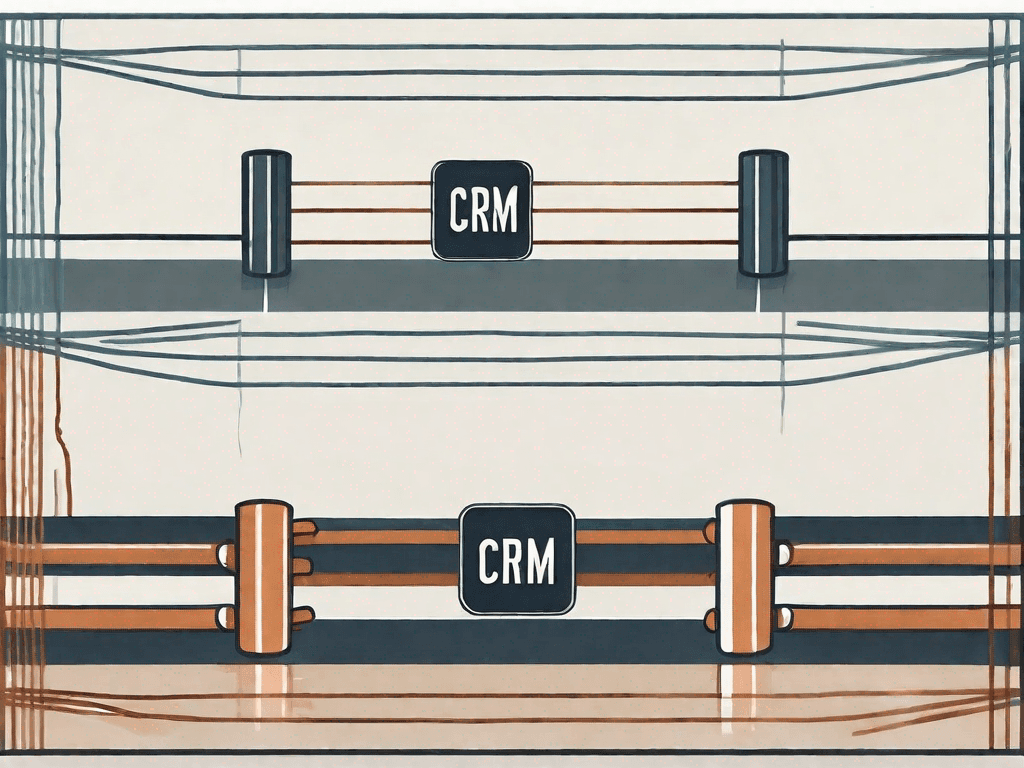
7 CRM Techniques to Help You Manage B2B Contacts Better
In today's highly competitive business landscape, effective management of B2B contacts is crucial for sustained success. Customer Relationship Management (CRM) techniques have emerged as powerful tools to help businesses streamline their contact management processes. This article will delve into seven CRM techniques that can significantly improve your B2B contact management practices. Let's explore each technique in detail and understand how they can enhance your business operations.
Understanding CRM and Its Importance in B2B
Before diving into the techniques, let's first define CRM and comprehend its significance in B2B management. CRM, or Customer Relationship Management, refers to the practices, strategies, and technologies businesses use to manage and analyze their customer interactions and data. In the B2B context, CRM plays a pivotal role in nurturing long-term relationships with clients and prospects, driving customer loyalty, and maximizing sales opportunities.
Defining CRM
CRM encompasses various aspects, including customer data collection, organization, and analysis, as well as strategies for customer engagement and retention. It enables businesses to gain valuable insights into customer behavior, preferences, and needs, which can be leveraged to provide tailored solutions and personalized experiences.
When it comes to customer data collection, CRM systems allow businesses to gather information from various sources, such as website interactions, email communications, social media engagements, and offline interactions. This data is then organized and stored in a centralized database, making it easily accessible for analysis and future use.
Once the data is collected and organized, CRM systems provide powerful analytical tools that allow businesses to extract meaningful insights. By analyzing customer behavior patterns, businesses can identify trends, preferences, and pain points, helping them develop targeted marketing campaigns and product offerings.
Furthermore, CRM strategies focus on customer engagement and retention. Through personalized communication and tailored experiences, businesses can strengthen their relationships with clients and prospects. This can be achieved through various channels, such as email marketing, social media interactions, and personalized offers.
The Role of CRM in B2B Management
In the B2B environment, where customer relationships are often complex and require careful nurturing, CRM allows businesses to effectively manage interactions across multiple touchpoints. It facilitates streamlined communication, efficient collaboration, and a holistic view of customer interactions, ensuring that no opportunity goes unnoticed. By centralizing and analyzing customer data, CRM empowers B2B businesses to make data-driven decisions and deliver exceptional customer experiences.
One of the key benefits of CRM in B2B management is its ability to enhance customer service. With a comprehensive view of customer interactions and preferences, businesses can provide timely and personalized support, addressing customer needs and concerns effectively. This not only improves customer satisfaction but also strengthens the overall relationship.
Moreover, CRM systems enable B2B businesses to identify and prioritize sales opportunities. By analyzing customer data and tracking their engagement with marketing materials, businesses can identify potential leads and tailor their sales efforts accordingly. This targeted approach increases the chances of converting prospects into customers and maximizing sales revenue.
Additionally, CRM plays a crucial role in fostering collaboration and alignment within B2B organizations. By providing a centralized platform for sharing customer information and insights, CRM systems enable different teams, such as sales, marketing, and customer service, to work together seamlessly. This collaboration ensures that everyone is on the same page and can deliver a consistent and cohesive customer experience.
In conclusion, CRM is a vital tool for B2B businesses, enabling them to effectively manage customer relationships, drive customer loyalty, and maximize sales opportunities. By collecting, organizing, and analyzing customer data, businesses can gain valuable insights and deliver personalized experiences. With streamlined communication and collaboration, CRM empowers B2B organizations to make data-driven decisions and provide exceptional customer service
The Art of Contact Management in B2B
Managing contacts is an art that requires finesse and attention to detail. B2B organizations must go beyond traditional contact management methods and adopt innovative approaches to stay ahead in a competitive market.
The Importance of Effective Contact Management
Effective contact management is vital for nurturing strong B2B relationships. It involves capturing and organizing essential contact information, such as names, job titles, and contact details, while also keeping track of interactions and preferences. By maintaining accurate and up-to-date contact records, businesses can personalize interactions, anticipate customer needs, and foster trust and loyalty.
Challenges in B2B Contact Management
However, B2B contact management is not without its challenges. With a vast network of contacts, managing data, ensuring data integrity, and avoiding duplications can be daunting. Moreover, the ever-changing nature of B2B relationships adds complexity, making it essential to have a robust contact management system in place.
CRM Techniques for Better B2B Contact Management
To overcome these challenges and optimize contact management in B2B, businesses can employ the following CRM techniques:
Technique 1: Segmentation
Segmenting your B2B contacts into distinct groups based on common characteristics allows for more targeted and personalized communication. By tailoring your messaging to specific segments, you can better address their unique needs and pain points, increasing engagement and conversion rates.
Technique 2: Personalization
Personalization is key to building strong B2B relationships. Leveraging CRM technology, businesses can collect and analyze customer data to gain insights into individual preferences, behavior patterns, and interactions. Armed with this knowledge, you can craft tailored solutions and provide personalized experiences that resonate with your contacts.
Technique 3: Automation
The manual management of B2B contacts can be time-consuming and prone to errors. Automating contact management tasks, such as data entry, updating, and tracking, not only saves time but also ensures accuracy and consistency across your database. Automation allows your team to focus on more strategic activities, improving productivity and efficiency.
Technique 4: Integration
Integration is paramount for seamless B2B contact management. By integrating your CRM system with other business tools, such as email marketing platforms or project management software, you can maintain a unified view of your contacts and their interactions. This integration facilitates efficient collaboration, eliminates data silos, and enhances overall productivity.
Technique 5: Analytics
Data analytics is a powerful tool for optimizing B2B contact management. By analyzing customer data, you can identify trends, preferences, and opportunities. Insights gained from analytics enable you to make data-driven decisions, refine your contact management strategies, and improve your overall business performance.
Technique 6: Mobile CRM
In today's mobile-centric world, having access to contact information on-the-go is crucial. Mobile CRM applications allow your team to access and update contact data, track interactions, and collaborate regardless of their location. This flexibility ensures that your contact management remains seamless and efficient, even when you or your team are working remotely.
Technique 7: Social CRM
Social media has revolutionized the way businesses interact with their contacts. Social CRM involves leveraging social media platforms to monitor customer conversations, engage with contacts, and gain valuable insights. By incorporating social CRM into your contact management strategy, you can proactively nurture relationships, address concerns, and tap into new opportunities.
Implementing CRM Techniques for Optimal Results
While understanding the techniques is crucial, implementing them effectively is equally important. The following steps will guide you towards successful implementation:
Steps to Implement CRM Techniques
Assess your current contact management processes and identify areas for improvement.
Choose a CRM solution that aligns with your business needs and goals.
Ensure seamless integration of the CRM system with existing tools and processes.
Educate and train your team on using the CRM system effectively.
Establish clear metrics to measure the success of your CRM implementation.
Regularly monitor and evaluate the performance of your CRM techniques.
Continuously refine and adapt your contact management strategies based on insights and feedback.
Overcoming Potential Challenges in Implementation
Every implementation process comes with its own set of challenges. To ensure a smooth transition and effective utilization of CRM techniques, consider the following:
Obtain buy-in from all stakeholders and ensure their involvement from the initial stages.
Communicate the benefits of CRM implementation to your team, addressing their concerns and providing proper training and support.
Regularly communicate progress and achievements to keep the team motivated and engaged.
Conduct periodic system audits to identify and address any technical or functional issues.
Seek feedback from your team and contacts to continuously improve your CRM practices.
In conclusion, CRM techniques are indispensable for effective B2B contact management. By implementing these techniques, businesses can optimize their contact management processes, strengthen customer relationships, and drive business growth. Assess your specific needs and goals, choose the right CRM solution, and leverage the power of segmentation, personalization, automation, integration, analytics, mobile CRM, and social CRM to propel your B2B contact management to new heights.











![The 8 Best Social CRM Software in 2025 [Comparison]](https://framerusercontent.com/images/RYHyYapdgIi83BEWtMdX418.png)
![The 6 Best LinkedIn CRM in 2025 [Comparison]](https://framerusercontent.com/images/Luywfni7ZKjb19yghbhNPy4I4qQ.png)



![The 5 Best Twitter CRM [Comparison]](https://framerusercontent.com/images/EWcbvYnVZglJLO8jp3OlHkTvsHo.png)


























































































































































































